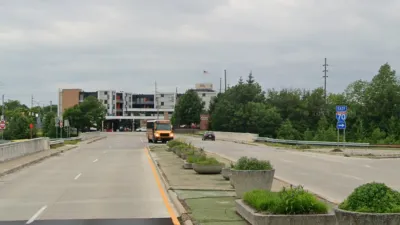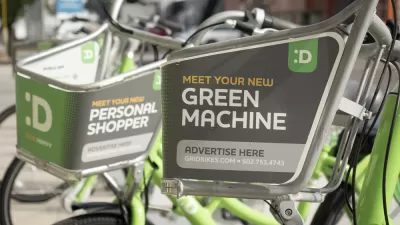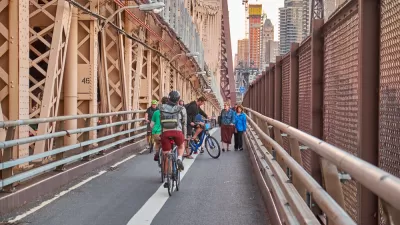If Gov. Jerry Brown signs AB 2245, a bill which will exempt bike lanes from the CA Environmental Quality Act until 2018, opponents of these lanes will be deprived of a major tool to delay these projects that may accompany controversial 'road diets'.
Aaron Bialick explains the significance of the bill, written by Assemblyman Cameron Smyth, R-LA County, that crosses traditional party lines to encroach upon the sanctity (for the environmental community) of the embattled California Environmental Quality Act (CEQA).
"When traffic lanes are removed to make room for bike lanes, CEQA typically requires planners to measure impacts using the car-centric formula known as Level of Service. That would change under the new bill. As the California Bicycle Coalition explains, "AB 2245 essentially requires cities to examine the same environmental impacts for bike lane projects as under CEQA, but in a much more streamlined and cost-effective fashion"
According to the CBC, "CEQA review for bike lanes can take anywhere from 12 to 18 months to complete, often costing more than the actual project on the ground. These timelines and costs deter many cities from the robust implementation of needed and necessary bike networks."
Surprisingly, a major supporter for the bill is none other than the Automobile Club of Southern California who are quoted in the Aug. 15 legislative analysis: "The encouragement of greater bicycling as a viable mode of transportation through the provision of these facilities should provide a net environmental benefit."
Also quoted is the California Chamber of Commerce, an organization known for its ability to "kill" legislation. "Additional bikeways will promote tourism and benefit the residents of the area where the project will take place", they write.
Opposing the bill is the United Transportation Union, representing many bus drivers throughout the state.
"The addition of Class II bikeway projects, undertaken by a city, county, or a city and county within an existing right-of-way, to the exemptions of current CEQA requirements, creates an unsafe condition for all motorists and bike riders in California", they write.
To read the bill, see the enrolled text: "This bill would, until January 1, 2018, exempt from CEQA the restriping of streets and highways for bicycle lanes in an urbanized area that is consistent with a prepared bicycle transportation plan..."
FULL STORY: New State Bill Would Streamline CEQA Reviews for Bike Lanes

Alabama: Trump Terminates Settlements for Black Communities Harmed By Raw Sewage
Trump deemed the landmark civil rights agreement “illegal DEI and environmental justice policy.”

Planetizen Federal Action Tracker
A weekly monitor of how Trump’s orders and actions are impacting planners and planning in America.

The 120 Year Old Tiny Home Villages That Sheltered San Francisco’s Earthquake Refugees
More than a century ago, San Francisco mobilized to house thousands of residents displaced by the 1906 earthquake. Could their strategy offer a model for the present?

LA’s Tree Emergency Goes Beyond Vandalism
After a vandal destroyed dozens of downtown LA trees, Mayor Karen Bass vowed to replace them. Days later, she slashed the city’s tree budget.

Sacramento Leads Nation With Bus-Mounted Bike Lane Enforcement Cameras
The city is the first to use its bus-mounted traffic enforcement system to cite drivers who park or drive in bike lanes.

Seattle Voters Approve Social Housing Referendum
Voters approved a corporate tax to fund the city’s housing authority despite an opposition campaign funded by Amazon and Microsoft.
Urban Design for Planners 1: Software Tools
This six-course series explores essential urban design concepts using open source software and equips planners with the tools they need to participate fully in the urban design process.
Planning for Universal Design
Learn the tools for implementing Universal Design in planning regulations.
Ada County Highway District
Clanton & Associates, Inc.
Jessamine County Fiscal Court
Institute for Housing and Urban Development Studies (IHS)
City of Grandview
Harvard GSD Executive Education
Toledo-Lucas County Plan Commissions
Salt Lake City
NYU Wagner Graduate School of Public Service





























